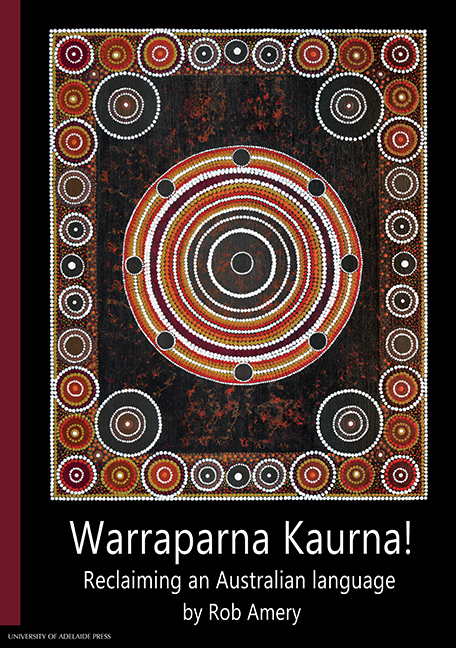Book contents
- Frontmatter
- Contents
- Maps, Plates, Graphs and Tables
- Preface to this Edition (2016)
- Foreword to the 2000 Edition
- Preface to the 2000 Edition
- Acknowledgements
- Abbreviations
- Conventions and Terminology
- Chapter 1 Locating the Study
- Chapter 2 Language Reclamation
- Chapter 3 An Ecological Approach to Language Revival
- Chapter 4 A Sociolinguistic History of Kaurna
- Chapter 5 Kaurna Sources
- Chapter 6 Restoring and Transforming the Kaurna Language
- Chapter 7 Kaurna Language Programs
- Chapter 8 Kaurna in Society
- Chapter 9 Kaurna Language Revival: The Formulaic Method
- Chapter 10 Sociopolitical Dimensions of Kaurna Language Revival
- Chapter 11 Into the Twenty-first Century: Developments since 2000
- Chapter 12 Summary and Conclusions
- Bibliography
- Index
Chapter 5 - Kaurna Sources
Published online by Cambridge University Press: 28 July 2017
- Frontmatter
- Contents
- Maps, Plates, Graphs and Tables
- Preface to this Edition (2016)
- Foreword to the 2000 Edition
- Preface to the 2000 Edition
- Acknowledgements
- Abbreviations
- Conventions and Terminology
- Chapter 1 Locating the Study
- Chapter 2 Language Reclamation
- Chapter 3 An Ecological Approach to Language Revival
- Chapter 4 A Sociolinguistic History of Kaurna
- Chapter 5 Kaurna Sources
- Chapter 6 Restoring and Transforming the Kaurna Language
- Chapter 7 Kaurna Language Programs
- Chapter 8 Kaurna in Society
- Chapter 9 Kaurna Language Revival: The Formulaic Method
- Chapter 10 Sociopolitical Dimensions of Kaurna Language Revival
- Chapter 11 Into the Twenty-first Century: Developments since 2000
- Chapter 12 Summary and Conclusions
- Bibliography
- Index
Summary
… [I]it is hoped that the reader will not expect a complete specimen of thelanguage. Eighteen months is but a short period for the study of an unwrittenlanguage, where no means of instruction exist, and where all information mustbe gleaned from casual and trivial conversation. To this must be added, theuncommon rapidity, abbreviation, and carelessness with which the Aboriginesspeak; their extreme reluctance for a long time, to inform the inquirer; theirnatural inability to answer grammatical questions; together with theirunfavourable situation for the study of the language. (T&S, 1840: v)
Now I don't see it as something that has been written by goonyas, therefore weshouldn't embrace it. It is there. It's ours. It has been recorded for us and indeedin some of those recordings our people are talking to us. But we need to decodeit.
(Lester Irabinna Rigney, interviewed by Jenny Burford, 21 October 1997)The vast bulk of documentation of the Kaurna language was recorded in the early years of the colonisation of South Australia, from 1836 to 1845, by a number of different observers, themselves of differing linguistic background including German, English and French. A short wordlist was even recorded a decade earlier in Western Australia.
Almost no new Kaurna material was recorded in the latter half of the nineteenth century. Some material was published or compiled in that period, notably Teichelmann (1857, 1858) and Wyatt (1879), but most, if not all, of this material was probably collected before 1845. No further original work seems to have been undertaken, post Teichelmann, until the twentieth century, when Daisy Bates (1919), John McConnell Black (1920) and Norman Tindale worked with Ivaritji, who was said to be the last remaining speaker of the Kaurna language (see Gara, 1990: 82). Tindale also recorded a few words from Alf Spender. This more recent material is indeed valuable, but it is not nearly as extensive as the work carried out last century. In addition, both Tindale and the Berndts recorded information about the Adelaide Plains and Kaurna traditions from Ngarrindjeri and Ngadjuri informants.
Tapes made more recently by the late Gladys Elphick and late Auntie Kumai (Rebecca Harris) could possibly reveal additional information. Gladys Elphick's life story is currently being written on the basis of these interviews, but the tapes and transcripts are not available to me at present.
- Type
- Chapter
- Information
- Warraparna Kaurna!Reclaiming an Australian language, pp. 85 - 127Publisher: The University of Adelaide PressPrint publication year: 2016



